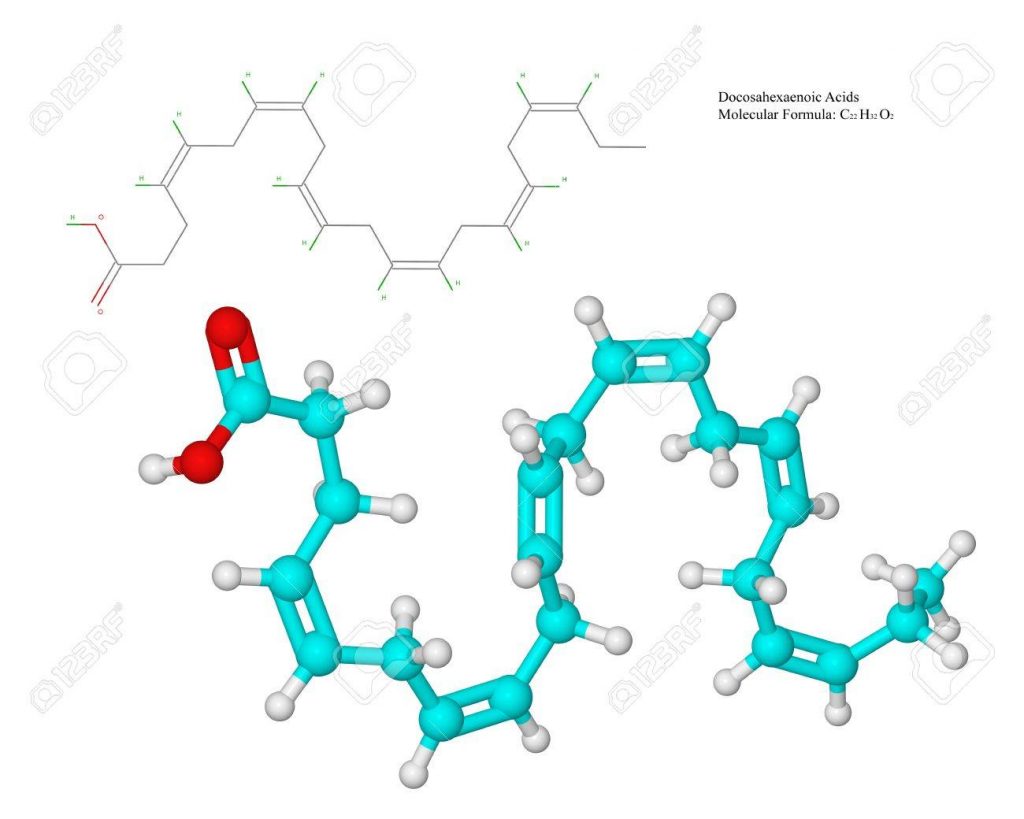Use of DHA in pregnancy
Assoc. Dr. Slagjana Simeonova Krstevska
University Clinic for Gynecology and Obstetrics, Medical Faculty Skopje
Omega-3 fatty acids are fats that have a range of health benefits: cell membrane stability, fetal development, improved cardiovascular health and Alzheimer’s disease.
DHA (docosahexaenoic acid) is an omega-3 fatty acid that is one of the primary structural components of the human cerebral cortex, skin and retina. DHA represents 97% of all omega-3 fatty acids in the brain and 93% of omega-3 fatty acids in the retina.
Sources of DHA
It can be found in cold water fish (salmon, anchovies, tuna, herring, catfish), shrimps, mussels, caviar, seaweed and eggs. Moderate consumption of certain types of sea fish is advised during pregnancy to avoid the risk of mercury intake.
Vegan diet lacks DHA and there is only a limited amount in the vegetarian diet. An important source of omega 3 fatty acids are flaxseed oil, canola and soy.
The diet of pregnant women in most parts of the world is considered to be deficient in DHA and it is not possible to meet the needs of pregnancy without supplementation.
DHA supplementation
In pregnancy, metabolic needs for DHA are increased due to increased needs of the fetus and placenta, compared to women who are not pregnant.
DHA supplementation in pregnancy is safe and numerous observational studies are being conducted worldwide on the impact of n-3 (omega-3) polyunsaturated fatty acid intake on the outcome of pregnancy and maternal and neonatal complications.
Prenatal DHA supplementation appeared on the market 15 years ago and the recommended dose is 400 and 800 mg DHA during the second half of pregnancy.
Impact of DHA supplementation on pregnancy outcome
Pregnancy is thought to last longer in pregnant women taking the supplement, and in some it reduces the risk of premature birth, preeclampsia and gestational diabetes mellitus.
According to a study conducted in 2018, pregnant women with gestational diabetes mellitus who received DHA supplementation of 800 mg / day had children who were less likely to become obese at 2 and 4 years of age.
Studies have shown that newborns of DHA-supplemented pregnant women have significantly higher birth weight and length as well as head length and circumference.
DHA is an important component for the accumulation of lipids in neural tissue during development. Therefore, DHA is essential for the neurological and eyesight development in the fetus. A study of monitoring the development of children aged 4-6 years whose mothers were supplemented with DHA in pregnancy, confirmed that supplementation with DHA was positively correlated with language ability, cognitive performance, coordination of movements and short-term memory in children.
DHA supplementation during pregnancy is thought to reduce maternal depression, but studies that made such findings have been found to be of low to moderate quality.
In contrast, studies show encouraging findings that supplementation with fish oil in pregnant women reduces the incidence of asthma in children. This may be due to the fact that supplementation is associated with reduced levels of cellular elements associated with inflammation and the immune response.
Omega-3 fatty acids are important for health in general and supplementation during pregnancy can lead to numerous benefits for the mother and fetus.
*The author confirms that there is no conflict of interest.
References:
- Susan E Carlson 1, John Colombo, Byron J Gajewski, Kathleen M Gustafson, David Mundy, John Yeast, Michael K Georgieff, Lisa A Markley, Elizabeth H Kerling, D Jill Shaddy DHA supplementation and pregnancy outcomes. Am J Clin Nutr. 2013 Apr;97(4):808-15.
- Maria Makrides. DHA supplementation during the perinatal period and neurodevelopment: Do some babies benefit more than others? Prostaglandins Leukot Essent Fatty Acids. 2013 Jan;88(1):87-90.
- Elvira Larqué , Alfonso Gil-Sánchez, María Teresa Prieto-Sánchez, Berthold Koletzko
Omega 3 fatty acids, gestation and pregnancy outcomes. Br J Nutr 2012 Jun;107 Suppl 2:S77-84.
- Danielle Swanson, Robert Block, and Shaker A. Mous. Omega-3 Fatty Acids EPA and DHA: Health Benefits Throughout Life
Adv Nutr. 2012 Jan; 3(1): 1–7.






